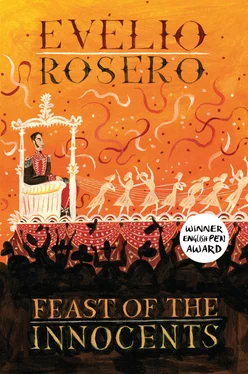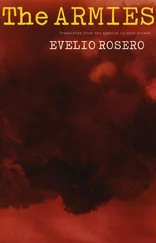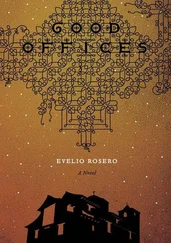He did not manage to say any more. He could not. But he left the workshop unhurriedly, like someone going for a walk, and got into his Willys. Doctor Proceso wondered if he should accompany him, speak to him, calm him down, leave with him, but Don Furibundo did not start the engine: he simply sat behind the steering wheel, sighed, scratched one cheek, smoothed down his hair, leant towards the glove compartment.
“He’s taken out a bottle of aguardiente ,” one of the smallest boys reported, perched on top of the wall, right at the corner by the doorway. “He’s drinking it, he’s still drinking it, he’s drinking it all up, he’s started to get drunk.”
“Are you Doctor Justo Pastor?” Maestro Abril asked meanwhile. His wife and the artisans had already gathered around the doctor.
“God bless you again,” his wife said, “forgive us for not recognizing you, would you like a nice cup of coffee?”
“Salvador, Salvador, where’s Salvador?” Maestro Abril asked all around.
One of the children came forward; he was just like all the others: ragged, face black with mud.
“Say how do you do to Doctor Justo Pastor, who helped you come into the world,” the maestro said, and Salvador held out his hand. At that same moment they heard from the boy up on the wall. A sort of delighted astonishment was apparent in his voice.
“Now he’s drinking another bottle. He’ll get even drunker.”
They all turned to look at the Willys: Furibundo Pita was slugging down what was left of a second bottle of aguardiente , as if it were water.
“If he carries on drinking at that rate he’s going to die,” Zulia Iscuandé said.
“And now what are we going to do?” the maestro asked his wife. “What are we going to do with that bastard? By God, I’m not about to wreck my float, Zulia, not for all the money in the world.”
“You should consider it,” his wife said.
Her husband’s steadfast gaze dissuaded her.
They heard the shattering of a bottle against the pavement: it was Don Furibundo, who had just smashed the bottle and got out of the Willys. His budding drunkenness clouded his eyes, he came straight towards the maestro, faced him once more:
“So?”
After an encouraging silence, came the maestro’s voice:
“No.”
And, very earnestly:
“Go back where you came from, señor . If you don’t want to see the float, don’t see it: don’t go out that day, pretend you don’t exist. Sooner or later everyone will forget all about it.”
“Dammit!” Don Furibundo was stunned. “I’m offering you what you’d win for first prize, and all because you’re making fun of me. What more do you want, Tulio, tell me what more you could possibly want? Tell me!”
Zulia Iscuandé sighed deeply.
The other artisans were also noticeably rattled: the thing was, hand on heart, during that whole year working on “Don Furibundo Chasing his Wife”—that was what the float was called — they had never imagined getting first prize. Maybe third, if God was on their side. So the offer unsettled them to the point of exasperation.
“Convince this pig-headed fool,” Don Furibundo urged them.
“No,” the maestro replied, “Nobody here is going to convince me of anything, and nobody comes here to shout at me either.”
“Well I won’t shout any more then,” Don Furibundo shouted. His voice had changed. He had become someone else.
And again they saw him run off towards his car.
Instinctively, they all took a step backwards.
This man is truly insane, the doctor thought, witnessing Furibundo Pita dash off, get in the jeep and poke about in the glove compartment again. They thought he might be looking for another bottle. He was not.
“He’s got out a gun,” the watchboy exclaimed, his delight now running over.
And so he had: Furibundo Pita came at them flat out, brandishing the weapon, his face ablaze. Maestro Abril set off at a run too, and could think of no better direction to head in than where the float was being built: he disappeared behind the monumental shape, closely followed by Furibundo.
And it was while watching Furibundo Pita pelt past that Doctor Justo Pastor Proceso Lopéz suddenly realized who it was he looked like.
“Simón Bolívar,” he said out loud. “He’s identical.” He was able to confirm this by lifting his eyes to the colossal figure on the float—“It’s Simón Bolívar himself”—because, in fact, the Furibundo Pita on the float looked even more like Simón Bolívar, but a hundred times bigger, he really was just as portrayed by the artists of the time, the selfsame so-called Liberator, Simón Bolívar, he thought.
But that amazement was to be surpassed by what followed, when the critical moments took place, the fleeting seconds while the two men were invisible behind the float; just as Zulia Iscuandé started to cry out “protect him, Our Lady of Perpetual Help” they heard a shot, then a second, and a third. It was as if the silence that followed made everything go cold.
“My God, he’s killed him,” the woman shouted now, raising her arms to heaven.
Don Furibundo emerged then from the bowels of the float, ran past the doctor, got into the jeep quick as a flash, pulled away and went honking off down the track.
Everyone ran to peer behind the float.
There was Tulio Abril, more alive than dead, without a scratch on him.
The vision of Simón Bolívar riding high on the float was just what Doctor Proceso needed as a better reason for living than his wife’s indifference and the raising of two contrary daughters. Before him lay the extraordinary possibility of showing, with a puff in papier mâché, what he had unsuccessfully planned to reveal twenty-five years ago, when he started writing The Great Lie: Bolívar or the So-Called Liberator, a Human Biography .
He based his own work on the foundations laid by Nariño historian José Rafael Sañudo, who was born in Pasto in 1872 and died in the same city in 1943. Sañudo had been the first historian in Colombia and practically the first on the continent — as Doctor Proceso used to stress enthusiastically — who dared irrefutably to unpick Bolívar’s historic image, without the false patriotic sentiment or the exaggerated style of flattery (ears deaf and eyes blind) that the great majority of historians have traditionally bestowed upon Bolívar since his death.
“A courageous biography,” the doctor wrote on the subject of José Rafael Sañudo. “Published in 1925, Estudios sobre la vida de Bolívar provoked the contempt and condemnation of his supporters, not just in the country at large, but in Pasto, among his fellow Pastusos, who professed ‘profound surprise and indignation at his abominable lampoon.’ In Manizales they hollered for him to be hanged, in Bogotá he was declared a traitor, the Colombian Academy of History called him an ungrateful son, the Bolívar Society also called him a son, but one unworthy of Colombia, and if on publication his book found one or two moderately serious commentators, all of them, without exception, discussed it in tones of sheer panic, and one, despite acknowledging that Sañudo committed no slander and each of his assertions was well founded, did not hesitate to label him a retrograde Pastuso, hirsute theologian, convoluted prose stylist and old casuist. These labels did nothing to dampen the spirits of the Pasto historian, a man who was also a mathematician and philosopher, a reader of authors in Greek and Latin, and who stirred up the storm in advance by giving his book the words of Lucian of Samosata — in Greek — as an epigraph: ‘do not write merely with an eye to the present, that those now living may commend and honour you; aim at eternity, compose for posterity, and from it ask your reward; and that reward? — that it be said of you, This was a man indeed, free and free-spoken; flattery and servility were not in him; he was truth all through .’”
Читать дальше












